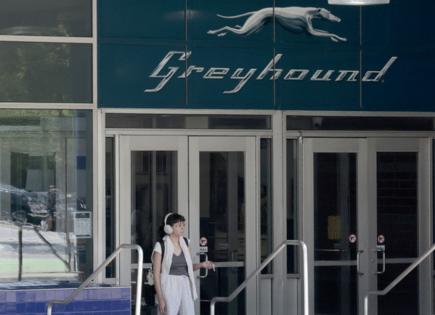After outcry, Greyhound plans to stay at its Chicago station at least a little longer
Published in Home and Consumer News
After pushback at the prospect of Chicago’s Greyhound bus station closing, the company that owns the intercity bus line says it plans to stay at the site a little bit longer.
Greyhound’s lease at the station on Harrison Street near downtown was set to expire Sunday, sparking months of efforts to find a suitable alternate site to serve bus passengers in Chicago.
Five days before the lease expired, Greyhound’s parent company, Flix, said it was close to reaching a temporary solution allowing the bus line to stay at the Chicago station for the time being. The parent company was finalizing a month-to-month lease to extend its time, but continued to work on other, long-term options for Chicago bus service, a Flix spokeswoman said.
Flix declined to answer questions about how much longer the company planned to stay in the station and what other options could be on the table to replace it.
Advocates have been sounding alarm bells about the possible closure of the downtown Chicago bus station for more than a year, saying such a move would have repercussions for the many low-income travelers who rely on Greyhound, residents of communities without easy access to train or airline service, and others who rely on buses to travel between cities, as well as Chicago’s status as a transportation hub.
The concern arose after a series of sales of Greyhound and its properties in recent years. Greyhound’s parent company sold the bus operation to German company Flix in 2021, but much of the bus line’s real estate was not part of the sale. The Chicago station is now among those owned by Twenty Lake Holdings, an affiliate of Alden Global Capital, which also owns the Chicago Tribune.
Greyhound stations in other cities have already been relocated, in some cases moved miles outside the city center or shifted to only curbside pickup and drop-off locations, with no indoor waiting areas. For example, in Knoxville, Tennessee, riders have reported waiting hours outside in the heat and cold for sometimes delayed buses, with no access to food, water, restrooms or a station building, according to local reporting.
Joseph Schwieterman, director of DePaul University’s Chaddick Institute for Metropolitan Development, who has been a proponent of a dedicated bus station, said the lease extension offered a temporary reprieve, but Chicago still needed to resolve what kind of station the city would provide travelers.
“Hopefully, public agencies will feel the need to deepen their involvement to avoid a meltdown that could hurt a critical travel sector,” he said.
City officials had been involved in talks to find a solution as the lease end date approached. A spokeswoman for the mayor’s office said in a statement on Tuesday that the city “remains committed to the continuation of essential intercity bus services” and was working with Twenty Lake.
“In collaboration with all stakeholders, including Greyhound, the City of Chicago is working to ensure that we are helpful in the short and long term but remain dedicated to developing a sustainable and viable solution that will outlast this temporary solution,” the statement said.
City officials have previously said Flix had an option to renew its lease at the station “under the same terms and conditions that it currently operates under.”
Ald. Bill Conway, whose 34th Ward includes the bus station, said he was “relieved” a temporary solution had been found.
“A closure this weekend would have stranded thousands, including many women traveling to Chicago for reproductive healthcare,” he said in a statement. “I look forward to working together on a long-term solution to establish a permanent multi-modal transportation hub for the region.”
Last week, Conway sent a letter to the mayor suggesting a city-owned asylum-seeker landing zone blocks from the bus station could provide a temporary option. It is equipped with security, had not received a bus in months and is close to Union Station, he wrote.
The loss of the bus station would affect thousands of travelers, he wrote, including those seeking reproductive care at nearby clinics. And the Greyhound station has had “consistent” public safety concerns, including an employee killed in 2022, which “underscore the need for a location that is secure and better equipped to handle bus operations.”
Other options to replace the bus station were floated in recent months, including relying more heavily on curbside pickup and drop-off outside Chicago Union Station, already served by a handful of buses. Amtrak, which owns the station, pushed back against that option. Advocates also said failure to have a dedicated bus shelter with amenities for passengers would bring consequences, and pose challenges for those waiting to make transfers or traveling during bad weather.
Amtrak spokesman Marc Magliari said on Tuesday that the temporary lease extension was “an outcome we have advocated.”
“We will continue to offer our support to the city and other stakeholders in sharing our expertise on what a purpose-built multimodal facility can do to improve mobility and connectivity,” he said in an email.
Greyhound had also seemingly begun adding more service through Gary, Indiana, as the end of the Chicago lease approached, according to a report from the Chaddick Institute.
Chicago’s Greyhound station now is used by Flix- and Greyhound-branded
©2024 Chicago Tribune. Visit at chicagotribune.com. Distributed by Tribune Content Agency, LLC.








Comments